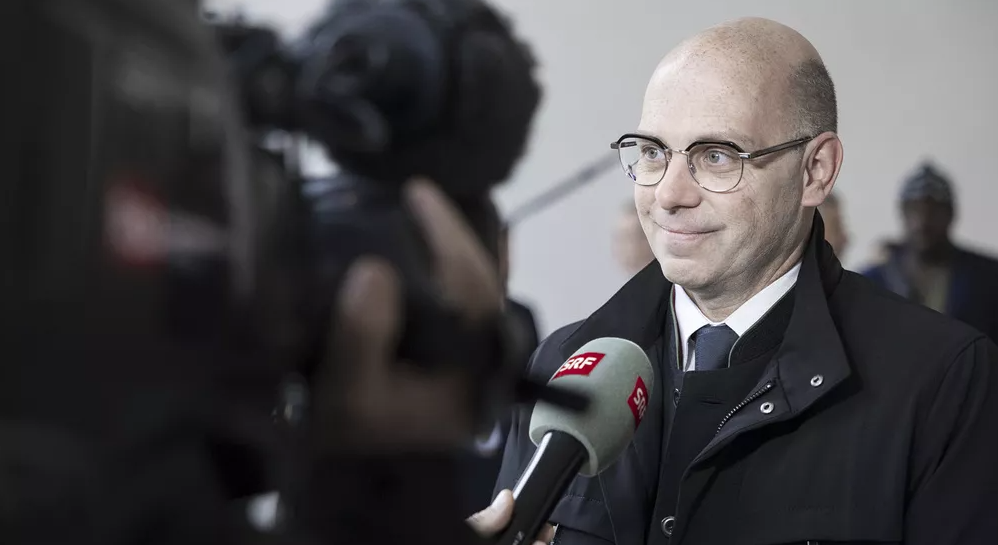Former Gambian Interior Minister Convicted: On Wednesday, a former Gambia interior minister was found guilty of crimes against humanity by Switzerland’s top criminal court in a historic conviction. According to a legal advocacy group, his conviction is based on his role in the repression committed by the Gambia’s security forces while the country’s long-serving tyrant was in power.
According to TRIAL International, the Gambia’s former interior minister, Ousman Sonko, was given a 20-year jail term. Sonko worked under President Yahya Jammeh from 2006 until 2016. Since it began in January, the trial has been under the intense scrutiny of advocacy groups hoping to use the principle of “universal jurisdiction,” which allows for prosecuting serious crimes committed abroad, to gain a conviction.
Bellinzona, a town in southern Switzerland, is home to the federal criminal court, where the verdict was handed down. According to TRIAL International legal advisor Benoit Meystre, who was present in the courtroom, Sonko showed no emotion when the translated verdict was read out in English. In November 2016, Sonko applied for refuge in Switzerland; two months later, he was arrested.
The Swiss attorney general’s office filed an accusation against Sonko a year ago. The charge covers alleged crimes that Sonko committed during Jammeh’s administration, which lasted for 16 years. Extrajudicial executions, sexual abuse, and arbitrary detentions were hallmarks of Jammeh’s reign. The accusations against Sonko in Gambia included killings, torture, rape, and many wrongful detentions, as well as supporting and taking part in these atrocities.
“This unprecedented conviction based on universal jurisdiction in Europe reaffirms that no individual is beyond the reach of justice,” Meystre noted in a text message. “Even the most influential figures can be held accountable for their involvement in mass atrocities.”
Jammeh, currently in exile in Equatorial Guinea, is expected to get a powerful signal from Sonko’s conviction, as brought to light by Madi MK Ceesay, an award-winning journalist who was once arrested under Sonko’s instructions. “The trial highlights the fact that wrongdoers will inevitably face consequences, irrespective of their position,” Ceesay stated in an interview with The Associated Press.
Human rights attorney Reed Brody of the United States, who was present at the trial, sees Sonko’s conviction as a significant step in bringing justice to Jammeh’s victims. “The long arm of the law is reaching Jammeh’s accomplices globally, and hopefully, it will soon reach Jammeh himself,” Brody stated.
According to X, charges of rape were withdrawn against Sonko, but he was found guilty of crimes against humanity, including murder, torture, and false imprisonment. Sonko was characterized by Philip Grant, executive director of TRIAL International, as the most senior ex-official to face prosecution in Europe by the mandate of universal jurisdiction.
Swiss prosecutors say that Sonko, who enlisted in the Gambian military in 1988, ascended the ranks and was in charge of Jammeh’s security as the head of the State Guard in 2003. After that, in 2005, he became the head of the Gambian police force as inspector general. Just before Jammeh’s regime came to an end in September 2016, Sonko was removed from his position as interior minister and went to Europe to seek asylum.
Note that the first name of prominent Senegalese politician Ousmane Sonko is spelled slightly differently, so keep the two distinct. His name is Ousman Sonko.
To grasp the gravity of Sonko’s belief, one must be familiar with the political climate of Jammeh’s tenure. In a 1994 coup, Jammeh took control of Gambia. In 2016, he lost the presidential election to Adama Barrow, but he refused to accept defeat. Jammeh subsequently fled the country amid threats of regional military action to remove him from power.
As a watershed moment for universal jurisdiction in Europe and Switzerland, Amnesty Switzerland celebrated the Ousman Sonko verdict as a victory in the struggle against impunity. Victims and their families have waited a long time for justice, and their statement on X stressed that even ex-ministers can be held responsible.



















